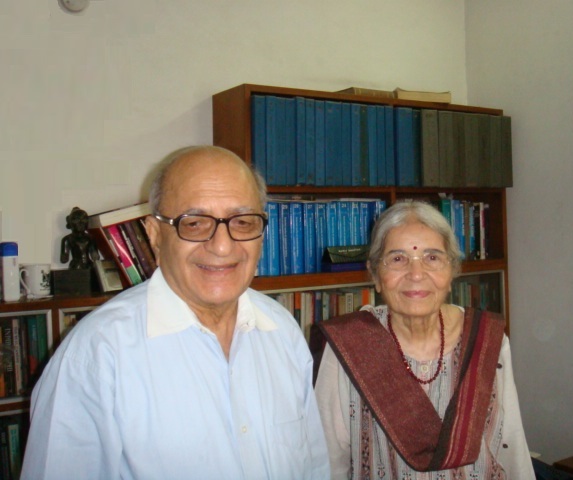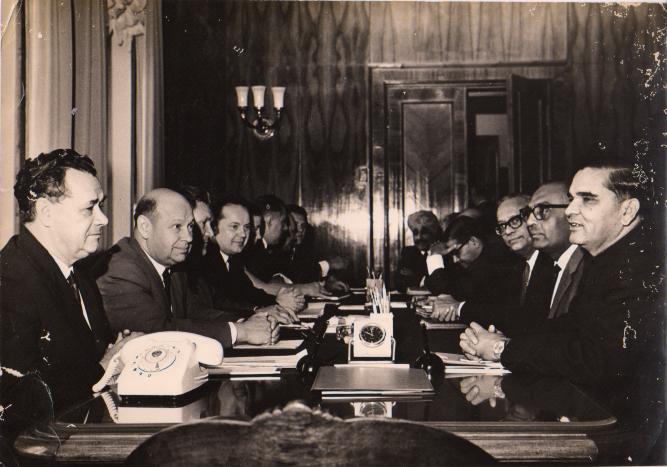VIDYABEN SHAH & MANUBHAI SHAH
On hearing that the renowned Journalist Shri Inder Malhotra (active as journalist 1946–2016) was not well, despite her advancing years, Vidyaben climbed the many steps to Inder's home to meet him. Inder said that on seeing her, he was already feeling better. As the photo here shows, he indeed looks very well. The year was the centenary year of Manubhai's birth. Inder said to Vidyaben that he had often thought over the years that people were forgetting the extensive work that Manubhai had done in post-independence India and that more people needed to write about it along side the much talked about liberalisation of the 1990s. He mentioned details about the work and how much he had admired Manubhai's zeal and how he had been wanting to pay tribute to Manubhai. He wrote a piece but because of health reasons, emailed it to Vidyaben. We were able to get the article from Vidyaben which is reproduced below.

IN 1956 when I was working for The Statesman, a highly prestigious paper then, where my duties included coverage of the economic ministries. P. T. Leuva, a Congress MP, said to me one day: “Let me give you some news. Very soon you will have a young and efficient Minister of Commerce and Industry. He is Finance Minister from Saurashtra and his name is M. M. Shah”. I made two comments on this. First that Saurashtra, a small state that was later merged into Gujarat, obviously had more talent than other much bigger states. For, two years earlier, hadn’t Saurashtra chief minister,
Some days later I decided to sound out two of the outstanding civil servants – then still joint secretaries, L. K. Jha and K. B. Lal about what they thought about their new boss. I spoke to them separately and totally off the record. I was struck that both of them said much the same thing, at this distance of time I have no hesitation to disclose it. They both said that Manubhai (I heard no one calling him M. M. Shah) was a man of “formidable competence”, “very quick on the uptake”, “thoroughly knowledgeable on every subject or issue” and, above all, “refreshingly quick to take a decision”. They wanted that there should be more ministers like him in a set-up where mediocrities seemed to prevail.
Manubhai’s residence was on Tughlak Road and I lived not far in the Indian Newspapers Society’s building on Rafi Marg. Often he would ring me up and ask me or I would ring him up to drop by or even have potluck with him. There would sometimes be other visitors also and I found that Manubhai’s wife the equally talented (even now every time my article is published, she is the first to call me to discuss the topic and remember the old times and astutely add a detail or two which I may have left out) and highly graceful Vidyaben would warmly welcome guests like me or anyone from any strata of society. I soon discovered that although both 24x7 workers they were always relaxed. Only once I saw Manubhai ruffled when a selfish visitor went on and on that he should get something done for the visitor. Unlike several other ministers who were friends of mine but were shaken if I asked them something that was secret (what in the government of this country is not?) Manubhai was never reluctant to reveal everything to me with the caution: “This is still confidential and must not be published or even mentioned to anyone”. He was sure that the confidence would never be betrayed. And his statements were never made up.
Today, more than 50 years later there will be no harm in revealing this. On one occasion Manubhai gave me a sensational news and told me that I could publish it provided its source was not revealed. Dhebar, he confided to me wanted to quit the office of Congress President and preferred to work may be in the executive as he had done as CM of Saurashtra. I published it in the next day's paper. All others who had missed the big news went to Dhebar to get a contradiction. He did not even meet them. A Congress general secretary did tell some journalists that my report was "substantially correct". The next day Dhebar put in his papers and announced it.
We continued to share a good rapport even after Manubhai left active politics after differences with elements of Sanjay-led politics which had crept in and I found that it was always valuable to listen to his analyses and insights in Indian politics and policy making. In my assessment, his contribution to Indian industry has been very significant and it may be right to even say that the first spurt of industrial growth after independence came due to Manubhai’s pioneering work. I saw India's industrial journey and exciting growth trajectory very closely as I was covering the economic ministries. I have also heard in the circuits, that Manmohan Singh himself says that it is Manubhai’s sterling work that got industry off the ground in India without which the next wave of liberalisation could not have happened. The setting up of the infrastructure and the industrial estates around the country was all work of Manubhai. His was a very liberal approach and he did away with licences and bureaucratic regulations whenever entrepreneurs (especially small and medium) came to him with proposals to set up businesses and industries. I have heard MPs from Gujarat say that Manubhai can create from "nought", that even where there was nothing in sight, Manubhai could see the potential and set up small scale industries. I saw him personally travel distances across the country to see to the setting up of units. He took me to the Okhla and Faridabad Industrial Estates to witness the potential that India had for diverse economic growth. This is not a subject I often write about, but it is time this was highlighted.
Manubhai was not only a respected economic policy maker but also was a shrewd judge of political trends. I heard him often say that one was dealing with political economy, not with politics or economics alone. It is well known that 1956 onwards were dominated by the Second Five-Year Plan which was P C Mahalanobis’s handywork. Manubhai agreed with much of it and disagreed with some elements. As Heavy Industries was part of his ministerial portfolio, his approach fitted with the Plan. I particularly remember the energy with which he pursued his own scheme of building a heavy machinery plant at Ranchi, and he told me that his idea was to have the slogan “Build big machines to build India”. On the other hand he was opposed to the “import substitution” policy. But he proceeded very very tactfully to persuade Prime Minister Jawahar Lal Nehru – after having done so in the case of other senior Ministers – that this would delay India’s industrialisation and make India’s exports difficult. That night I happened to meet him and he told me how happy he was that the Cabinet took the decision unanimously. Manubhai’s policies on rapidly developing small scale and cottage industries, he said, were also endorsed by the PM and his Cabinet throughout his tenure and I remember the setting up of the Cottage Industries Emporium in New Delhi at his behest. Manubhai’s contributions are many.
In spite of all this Nehru at one stage was miffed with one of his best Ministers on the issue of division of ministerial portfolios as Manubhai in his candid style bluntly told the PM what he thought. On several occasions Manubhai had openly disagreed with him. But he never asked Manubhai to quit. On one occasion Nehru asked him to travel with him in his plane where he would like to “discuss all matters fully”. But as Manubhai told me later, Nehru got into the aircraft unbuttoning his Sherwani and immediately went to sleep. No other meeting took place between the two in that trip. In the following years Manubhai continued to be in the Cabinets of Nehru, Lal Bahadur Shastri and Indira Gandhi.
India is a parliamentary democracy and it is an important task of every Minister to carry Parliament with them. Few did it better than Manubhai and he often spiced his answers to loaded or leading questions with a touch of humour. Even more impressive was his ability to site all convincing facts without a look at any piece of paper. Even in his personal life, wit and humour were a part of his personality. On one particular occasion, top officials of the Commerce Ministry gave a very detailed and informative press conference. After that I dropped in on Manubhai. At that moment came in L K Jha, and on seeing me exclaimed, “so much news given to you and still so news hungry.” My answer was, “L K there are so many hungers some of which are practically insatiable.” All three of us laughed heartily.
Manubhai and Vidyaben had retained their interest in Gujarat and Saurashtra where apart from political affairs, they had been involved in many social activities which Vidyaben often recounted to me. Some years before Manubhai came to Delhi, Nehru and Indira had known and visited Manubhai and Vidyaben in Rajkot regarding Vidyaben’s pioneering work with women and children. I used to marvel at how Manubhai found time to support Vidyaben in her extensive social work now in Delhi.
There are many innovations that Manubhai made throughout his tenure as Minister. The most important according to me was the one to make the Government and the country conscious of productivity as an essential component of development. The National Productivity Council is his signal contribution to the governance structure. Another great service to the country that he did was to promote Indian exports to every foreign country in the world. A remarkable feature of his working style was to welcome every foreign leader who came to sell their wares to India, and Manubhai’s question to them was, “what will you buy from us.” In this manner a Russian delegation was persuaded by him to buy many things including tea. When they had worked out an agreement, Manubhai asked the leader of the Russian delegation whether he could persuade him to buy some more tea. His answer was equally witty, “Minister I can drink only one more cup.”
On 6 June 1966 – people called it 6/6/66 – the rupee was devalued. Actually this decision had been taken in Shastri’s time but because of his death at Tashkent, Indira Gandhi had to carry the can. It was much too late before it occurred to her that she had committed a grave mistake. It says a great deal both about the man and the moment that the only Minister who opposed devaluation was Manubhai Shah.
